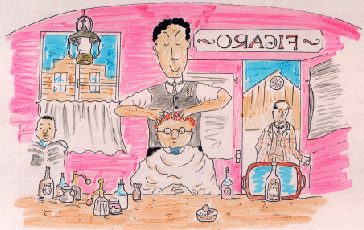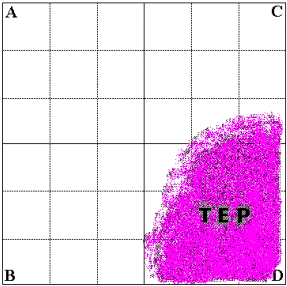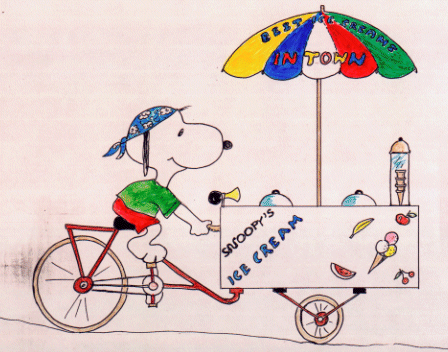|
navigation
consulting
services
training
services
specials
reading
material
resources
|
Total Employee Involvement targets at empowering people, especially Groups (teams).
There is a simple "model" that enterprises moving into TEI may adopt as an operational scheme and as a symbol: the Figaro model.
 Rossini's Il barbiere di Siviglia was produced over a century ago. Rossini's Il barbiere di Siviglia was produced over a century ago.
Figaro sings "....oh, che bel vivere, oh che piacere, per un barbiere di qualità..... ...tutti mi vogliono, tutti mi chiamano... ...Figaro qua, Figaro là......".
This means "....oh, what a beautiful life, oh what a pleasure, for (to be) a quality hairdresser.... ..... everybody wants me, everybody calls me... ....Figaro, here! Figaro, there!....".
There are a few keywords in Figaro's "aria" : (job) satisfaction, involvement, commitment, and, most important, pride.
What has happened to workers' and employees' pride (well known and extolled at Rossini's time)? What has happened in industry, in just half a century, to make almost disappear the concept of pride associated with work?
Surely, a major industrial crime has gone un-detected, un-accounted, un-punished. Surely, Smith's principles, perfected by Taylor and brought to operational extremes in the 50s - 60s, have left a deep mark in industrial behaviours. Workers and employees' pride has gone down the drain in a very long period of labour division and work fragmentation. Work, through specialisation and compartmentalisation has been depersonalised. People have become a number, an employee code ("....this product's quality has been controlled by operator N. 23..."). People have been kept "isolated", in their working cubicle, to prevent them from "polluting" others. People have been praised for clocking in/out at the correct time. People have been promoted for their "years of service". Bureaucracy has killed any initiative, as well as the ability to think. And much more.....
TEI - Total Employee Involvement (more ») is the first attempt, in industrial history, to give back to people pride (not to mention dignity).
TEI has reconciled things. TEI has put together again the fragments arbitrarily broken by Smith's ideology, and given people "space", space to be a "craftsman" in the "own" shop, a new industrial Figaro.
TEI has given people areas of purpose.
Total Employee Involvement has developed over the recent years.
In a world-class environment (very close to the bottom-right corner of the Organisational Strategies grid) there is space for a new breed of people, performing people.
TEI has developed into Total Employee Performance (TEP).

TEP is a development and extrapolation of TEI, that brings to extreme levels the degree of involvement of people, by applying in various modes the concept of VENTURE, representative of the world-class Model D.
The development is simple, but the entity of the shift is vast: people are not only seen as owners of a process, they are now seen as "entrepreneurs" in the process.
Entrepreneurs in the enterprise, also called "intra-preneurs", are the core principle of TEP.
There is a simple "model" that world-class enterprises willing to move into TEP may adopt as an operational scheme and as a symbol: the ice-cream-street-parlour model.
In some countries ice-cream street vendors still exist. Whether they go around by bicycle or by motorised truck, they have a number of features in common:
- They "invent", or develop, or "copy" their business, as well as their product.
- They produce their product, in the right quantity, with the right quality, at the right time.
- They market their product: they know which are the best routes to take at which time in order to gather customers and attract their attention by yelling, ringing a bell or playing their "carillon" music.
- They deal (frontline) with their customers, and attempt (the best of them) to give customers a good service (to generate "repeat" business).
- They cash the money and administer the money. Eventually they bank it and do some basic "profit & loss" calculation. They take care of the cash-flow aspect and others.
- They maintain, clean and keep in spotless conditions their cart, or truck, or vehicle.... and take care of the overall image parameter.
They are entrepreneurs and businessmen.
This is exactly what TEP tries to achieve: creating the right conditions for developing entrepreneurs in the enterprise, people that are not only in charge of an operational process (core or support - individually or in team) and "own" it, but are also in charge of part of the central process (the money-making process).
This is a drastic development in respect of the TEI approach.
In formats that vary from enterprise to enterprise and from situation to situation, the enterprise splits into a number of business processing units (bpu).
Guided and co-ordinated by common cultural values and policies/strategies, people (individuals or, most generally, teams) now own (even "formally", in certain cases) a business processing unit.
The business processing unit may be created "per product" or "per range of products" or "per client" or "per groups of clients" or in other ways.
Everything happens in the bpu : from generation of opportunities, to operations, marketing, and even accounting.
The enterprise becomes an "horizontal" layer of bpus, small, simple, flexible, reactive, lean, dynamic, in strict relationship with market and clients.
The main key-words are small and simple. The operational motto is
small is beautiful - simple is beautiful
The Micro/Small Enterprise Italian Model, invented over 40 years ago, is still alive and kicking.
Adam Smith's plague is extinct.
|



